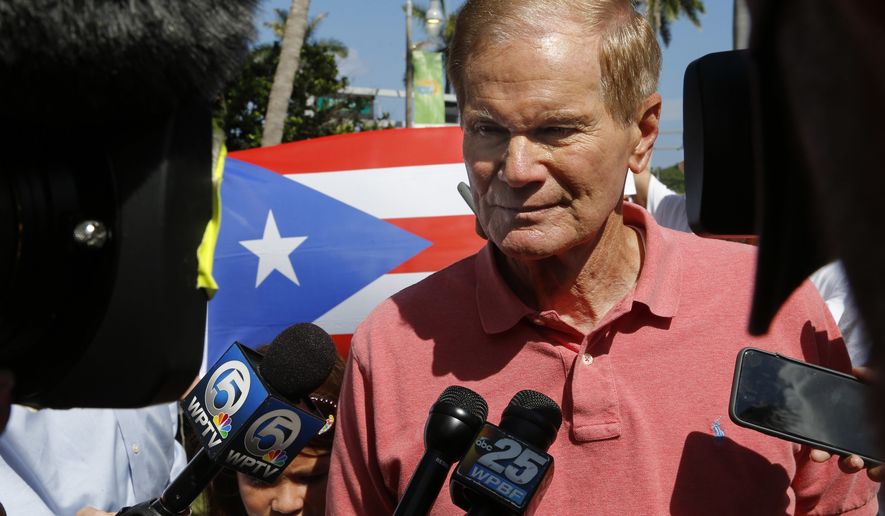Florida’s Democratic Sen. Bill Nelson has taken a lead over Republican Gov. Rick Scott in the Sunshine State’s tight midterm battle, an extraordinarily expensive race upon which the Democrats’ dream of retaking a Senate majority could rest, according to the latest Quinnipiac Poll.
Although the election remains a toss up according to professional oddsmakers, the new poll shows Mr. Nelson with surprising 7-point lead less than a month after Quinnipiac had the race tied, said Peter A. Brown, the assistant director of the university’s respected polling operation.
On Sept. 5, Quinnipiac had the two tied at 49 percent.
Mr. Brown attributed the incumbent’s surge to his standing with women in the poll of likely voters, where he holds a 58-41 advantage. With men Mr. Scott clings to a smaller edge, winning that demographic by 51-47, according to the poll.
In recent weeks the race has been roiled first by Sen. Nelson’s unsubstantiated claims Russian operatives had penetrated the state’s voting apparatus, a charge denied by state and federal officials, and Mr. Scott’s handling of a red tide and toxic algae breakout that has crimped Florida’s critical tourism industry.
The Nelson campaign is also benefiting from the emergence of Tallahassee Democratic Mayor Andrew Gillum, who overcame the more establishment-liberal Rep. Gwen Graham to win Florida’s Democratic gubernatorial primary. Mr. Gillum’s once radical proposals such as abolishing ICE and enacting a huge raise in the state’s corporate income tax have made him the darling of the rising left-wing in the Democratic Party, and his status as an African-American could also have a positive spillover effect for Mr. Nelson if that galvanizes the state’s black electorate, according to several political strategists in Florida.
Indeed, Quinnipiac’s numbers gave Mr. Nelson a 90-10 lead among black voters, while Mr. Scott leads among white voters 53-45.
Florida’s large Hispanic population may also prove decisive in a state that has seen recent gubernatorial and presidential elections decided by extremely narrow margins. The Cuban-American population no longer comprises the largest sector of Florida’s Latino population, according to demographers, and the Puerto Rican population has increased since the island was ravaged by Hurricane Maria last year.
Mr. Scott has assiduously courted the Puerto Rican vote since Maria, although Mr. Nelson continues to hold a commanding 61-39 percent lead with Hispanic voters, according to Quinnipiac. Florida Democrats, who have tried to depict Mr. Scott as essentially a rubber stamp for President Trump, have seized on Mr. Trump’s tweets about Puerto Rico and the death toll from Maria as a weapon with which to paint the Republicans as heartless.
How much Mr. Trump may influence the gubernatorial vote is unknown, but at the moment his job approval in the state has him at a 44-54 disadvantage, according to Quinnipiac.
For their part, Republicans have labored to define Mr. Nelson as a pawn of Democratic congressional leaders like New York Sen. Chuck Schumer, and as a lackluster lawmaker who, for all his likability, has not accomplished enough in Washington to deserve a third six-year term as senator. Despite that costly effort, Quinnipiac’s poll showed Mr. Nelson still enjoys a positive favorability rating of 53-41 while Mr. Scott is underwater on that count by a 46-51 margin.
Given the close outcomes of so many statewide races, independent voters in Florida could make the difference, but Quinnipiac’s poll shows most voters seems to be locked in to their decision.
“Among Florida likely voters who name a candidate choice, 94 percent say their mind is made up,” according to Quinnipiac.
• James Varney can be reached at jvarney@washingtontimes.com.




Please read our comment policy before commenting.